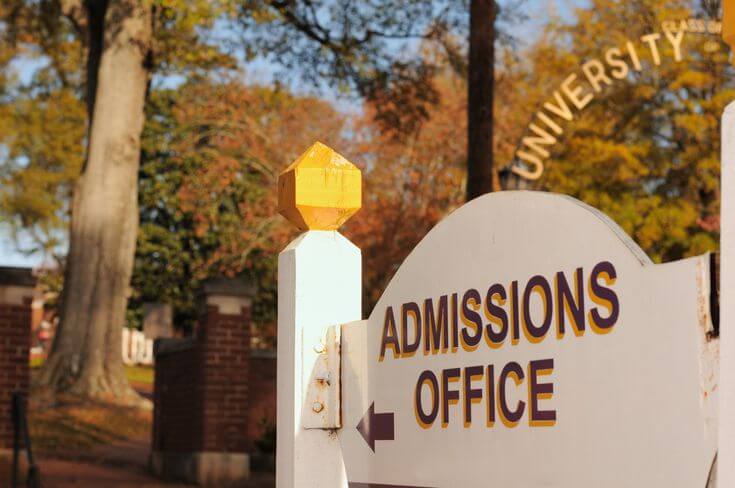Student-centric advice and objective recommendations
Higher education has never been more confusing or expensive. Our goal is to help you navigate the very big decisions related to higher ed with objective information and expert advice. Each piece of content on the site is original, based on extensive research, and reviewed by multiple editors, including a subject matter expert. This ensures that all of our content is up-to-date, useful, accurate, and thorough.
Our reviews and recommendations are based on extensive research, testing, and feedback. We may receive commission from links on our website, but that doesn’t affect our editors’ opinions. Our marketing partners don’t review, approve or endorse our editorial content. It’s accurate to the best of our knowledge when posted. You can find a complete list of our partners here.
An Insider’s View of What Happens Inside a College Admissions Office
 By
Will Geiger
By
Will Geiger 
Will Geiger is the co-founder of Scholarships360 and has a decade of experience in college admissions and financial aid. He is a former Senior Assistant Director of Admissions at Kenyon College where he personally reviewed 10,000 admissions applications and essays. Will also managed the Kenyon College merit scholarship program and served on the financial aid appeals committee. He has also worked as an Associate Director of College Counseling at a high school in New Haven, Connecticut. Will earned his master’s in education from the University of Pennsylvania and received his undergraduate degree in history from Wake Forest University.
Full BioLearn about our editorial policies

I worked in the trenches of the admissions process at Kenyon College for a good four years. Working my way through to the position of Senior Assistant Director of Admissions, I read thousands of applications, interviewed hundreds of students, and sat in on four entire applications cycles of decision-making committees. When I sat down during “reading season” to evaluate the hundreds of applications that came before my desk, I considered multiple factors.
Here is a breakdown of how the different parts of the application play a role in the decision-making process:
Academics (transcript)
Any admissions officer will tell you that the most important part of the application review process is the high school transcript. This includes grades and the rigor of the classes that you took. The transcript will also reflect any trends in your high school career (for instance, it is always positive if your grades improved each year). The transcript is always reviewed in the context of your high school. Did your high school not offer AP classes? That’s totally okay and colleges won’t penalize you for not taking any. But if your high school did offer many AP classes and you didn’t take advantage of them, then that will be a problem.
In addition to the transcript, other things that will be considered are:
Testing
At most schools (with the exception of colleges that are test-optional), testing a part of the admissions process. You will most likely take the SAT or the ACT, or perhaps both. If you are interested in receiving college specific or outside merit scholarships, it is in your best interest to take either the SAT or ACT.
If your test scores aren’t great, don’t worry too much. Some schools emphasize testing more than others. But as a rule of thumb, it is helpful to have scores that are higher than average. Testing can also be contextual. For instance, if you are applying to a strong engineering program, your math testing will be very important.
Further reading: ACT vs. SAT: How to decide which test to take
Essays
This is one of the few opportunities in the admissions process for your voice as a person to come through! The best personal essays are not about the oddest or most extraordinary experiences of your life. Instead, they give the admissions officer a glimpse into your life and unique perspective on the world. Of course, the essay is also an opportunity to demonstrate your writing ability.
Related: How to write a 500 word essay
Recommendations
While transcripts provide the raw data of your achievement in the classroom, letters of recommendation provide a qualitative assessment from your teachers about you as a scholar and learner. The most effective recommendations come from a teacher who knows you really well and can speak to your ability as a student. Ideally, recommendations should come from a teacher you had during your junior year. Read more about recommendations here.
Activities
When a college is considering your application, they are evaluating you not only as a student, but also as a person and community member. An activities list should include all of the ways you spend your time out- side of the classroom. This can include volunteering, clubs, sports, music, art, volunteering, a part-time job, taking care of younger siblings, and starting a business. Remember, colleges are looking for quality over quantity. The most compelling activities lists include things that the student is clearly passionate about.
Interviews
Similar to the personal essay, interviews are an opportunity for your voice and perspective to come through. Sometimes, a college admissions office will “recommend, but not require” interviews in their application review. As a rule of thumb in the admissions process, you should do anything that colleges recommend. Interviews are usually very conversational, so there is no reason to be stressed. Typically, it is just an opportunity to talk with an admissions officer (or current student) about your passions inside and outside of the class- room, as well as your interest in the college. Check out our guide to answering scholarship interview questions which has a few general pointers.




 SAT" printed on his pencil">
SAT" printed on his pencil">
